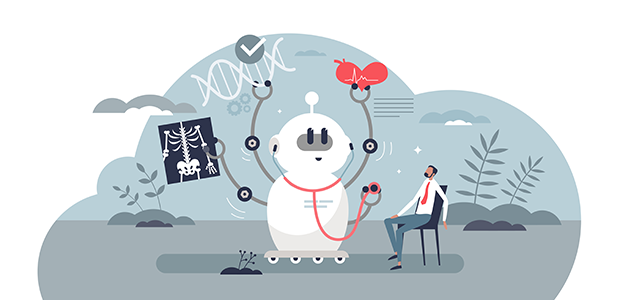
Revolutionising healthcare: the potential and challenges of AI!
As artificial intelligence (AI) continues to make strides in various industries, the potential for transforming healthcare seems more promising than ever.
The integration of AI could transform diagnostics, treatment planning, and patient care – but to unlock its full potential, we must first address several challenges.
AI's impact on healthcare
AI can make a significant impact in several areas, including:
- Diagnostics and medical imaging: AI algorithms can analyse medical data and images faster and more accurately than humans while being more accessible, leading to quicker diagnoses and effective treatments. This is particularly transformative in remote areas. Early disease detection can improve patient outcomes and reduce healthcare costs
- Personalised medicine: By analysing genomic data and clinical records, AI can determine the most effective treatment options for individual patients. Targeted therapies based on a patient's unique genetic makeup can reduce side effects and improve treatment efficacy
- Drug discovery and development: AI can analyse vast amounts of data to identify new drug candidates and predict their efficacy, significantly reducing the time and cost of bringing new drugs to market
- Remote patient monitoring: AI-powered wearable devices can monitor patients' health in real-time, alerting healthcare providers to any concerning changes. This allows for more proactive care and can reduce the need for hospitalisation
- Improved healthcare administration: AI can streamline healthcare administration by automating tasks such as appointment scheduling, claims processing, and medical coding, reducing human error and improving efficiency
Addressing AI integration challenges
To ensure successful AI integration in healthcare, several challenges must be addressed:
- Data quality and accessibility: AI algorithms need high-quality data to function effectively. Healthcare data is often fragmented, unstructured, and stored in various formats, complicating AI system analysis. Patient privacy and data security concerns can also hinder data sharing and accessibility
- Regulatory and ethical considerations: AI integration raises ethical and regulatory concerns, such as patient privacy, data security, and potential biases in AI algorithms. Clear guidelines and policies are necessary to address these issues while promoting innovation and progress
- Technological limitations: While AI has advanced significantly, some tasks still require human expertise and judgment. AI should augment healthcare professionals' decision-making rather than replace them entirely
- Resistance to change: Implementing AI in healthcare may face resistance from professionals concerned about job security or distrust of AI's diagnostic and treatment capabilities. Fostering collaboration between humans and AI is crucial for successful integration
- Investment and infrastructure: AI implementation requires investment in data storage, IT infrastructure, and analytics teams. Organisations must be willing to invest in these resources to benefit from AI’s potential fully
Shaping the future of AI in healthcare
Despite the challenges, AI integration in healthcare holds immense promise for better patient outcomes regardless of social status or geographical location. Collaboration between AI developers, healthcare professionals, and regulatory bodies is essential to overcoming these challenges and ensuring responsible and effective integration.
One solution is to focus on education and training. Healthcare professionals need opportunities to learn about AI applications and how to use AI tools effectively and responsibly. Likewise, AI developers should be educated about the unique requirements and challenges of the healthcare industry to develop tailored AI solutions.
Strong governance structures and processes are crucial for successful AI integration. Innovation steering committees can identify areas where AI can be most effectively applied and oversee AI solution implementation. These committees can ensure AI usage aligns with an organisation’s goals and values while minimising risks.
To address data quality and accessibility concerns, healthcare organisations must invest in robust information governance structures. Policies and procedures related to data sharing, de-identifying patient data, and cybersecurity are essential for building a strong foundation for AI integration.
Lastly, healthcare organisations must be prepared to adapt as AI technology evolves. This may involve re-evaluating AI solutions, adjusting policies and procedures, and investing in ongoing education and training for healthcare professionals.
The future of healthcare with AI integration holds enormous potential for improving patient outcomes, reducing costs, and transforming the industry. By addressing the challenges associated with AI integration and fostering collaboration between AI developers, healthcare professionals, and regulatory bodies, healthcare organisations can successfully harness the power of AI and create a brighter future for patients and providers alike.
Embracing AI in healthcare means staying agile and responsive to the ever-evolving landscape. As AI technology improves, we can expect more sophisticated tools and applications to emerge, offering even greater opportunities for enhancing healthcare delivery. It's essential that healthcare organisations remain open to change and continuously explore new ways to incorporate AI into their operations.
This journey won't be easy, but with a shared commitment to collaboration, education, and responsible innovation, the potential rewards are immense. In the long run, AI integration could lead to a more efficient, personalised, and patient-centred healthcare system, ultimately benefiting both patients and providers.
As we move forward, it's crucial to keep the conversation going among all stakeholders in the healthcare ecosystem – from AI developers and healthcare professionals to policymakers and patients. By engaging in open dialogue, and continuous learning and adaption, we can collectively navigate the challenges, identify best practices, and ensure that AI is used ethically and effectively to improve healthcare for everyone.
So, as we stand on the precipice of a new era in healthcare, the time is ripe for embracing AI's potential. With a focus on collaboration, education, and responsible innovation, we can harness the power of AI to transform healthcare and, ultimately, improve the lives of patients across the globe. The future of AI in healthcare is not just a vision – it's an attainable reality, and the steps we take now will shape the course of this exciting journey.

